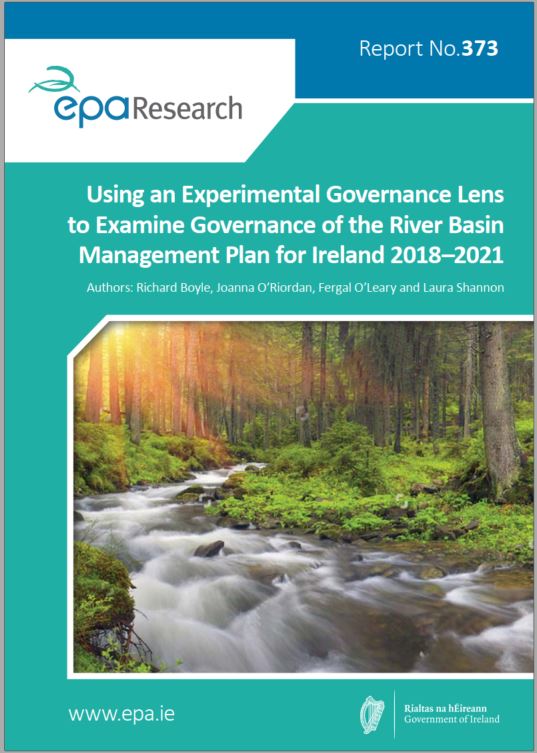Research 373: Using an Experimental Governance Lens to Examine Governance of the River Basin Management Plan for Ireland 2018–2021
Authors: Richard Boyle, Joanna O’Riordan, Fergal O’Leary and Laura Shannon
Summary: This report examines lessons learned from the water governance arrangements put in place for the River Basin Management Plan (RBMP) 2018–2021 for Ireland through the lens of experimental governance. The study finds that the three-tier governance structure is appropriate and should be continued. However, there is still room for improvement in the area of adapting and improving the operation of the existing arrangements.

Project Highlights
Watch the project highlights video
Executive Summary
This report examines lessons learned from the water governance arrangements put in place for the River Basin Management Plan (RBMP) 2018–2021 for Ireland through the lens of experimental governance. Experimental governance is a phrase coined by academics to describe a system of governance that is open to change based on the practical lessons learned through implementation. It is particularly suited to help address so-called wicked problems, which comprise challenges such as climate change and water management. A particular emphasis is put on informing policy and practice with regard to ensuring that appropriate and effective governance arrangements are made in Ireland for the third-cycle RBMP 2022–2027.
The governance system examined is based on a three-tier structure: (1) a Water Policy Advisory Committee and the Water Forum (An Fóram Uisce) advising the Minister for Housing, Local Government and Heritage; (2) a layer of technical support provided by the National Coordination and Management Committee, the Environmental Protection Agency and the National Technical Implementation Group; and (3) local authorities, supported by regional committees and a local government shared service, the Local Authority Waters Programme (LAWPRO), involved in implementation.
The study finds that the three-tier governance structure put in place to support the implementation of the RBMP is appropriate and should be continued. Rather than radical changes to the governance structure for the next RBMP, it is more a case of adapting and improving the operation of the existing arrangements. The three-tier structure represents a significant innovation and improvement over the governance arrangements in place for the first-cycle RBMP. Recommendations for further improvements are made in the report.
Related Publications
An Fóram Uisce (The Water Forum) as an Example of Stakeholder Engagement in Governance
https://www.epa.ie/media/epa-2020/research/epa-funded-research/Twitter_373.jpg